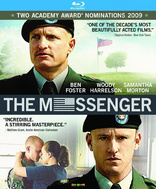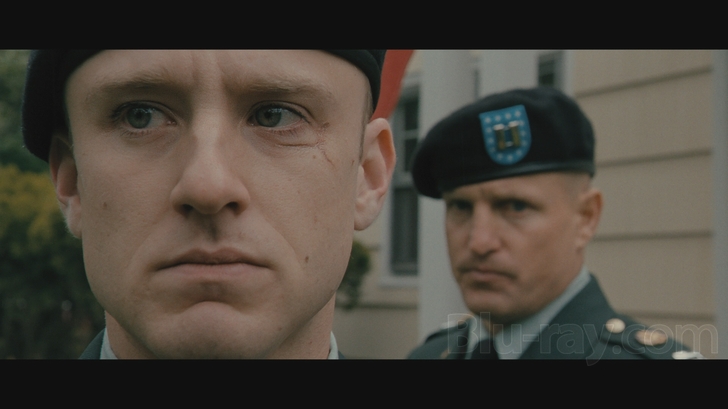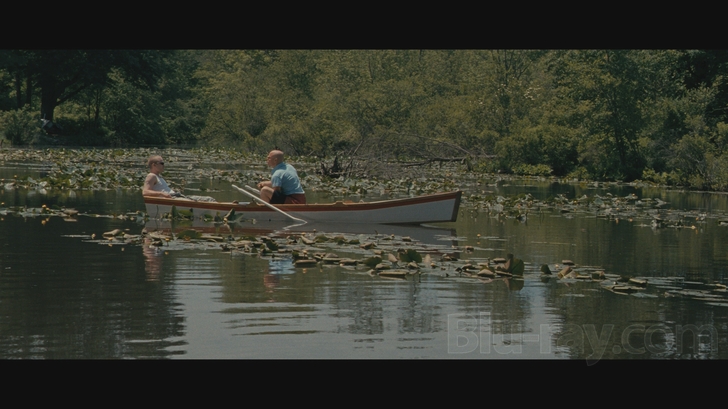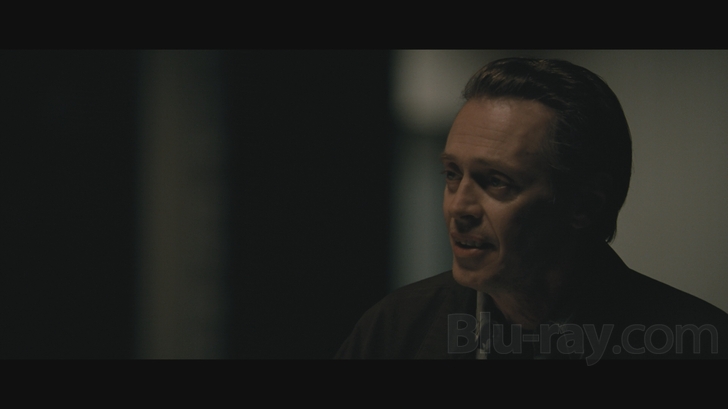The Messenger Blu-ray Movie
HomeThe Messenger Blu-ray Movie 
Blu-ray + DVDOscilloscope Pictures | 2009 | 113 min | Rated R | May 18, 2010

Movie rating
7.1 | / 10 |
Blu-ray rating
| Users | 4.0 | |
| Reviewer | 4.0 | |
| Overall | 4.0 |
Overview
The Messenger (2009)
U.S. Army officer is assigned to the Army's Casualty Notification service. He struggles with an ethical dilemma when he becomes involved with a widow of a fallen officer.
Starring: Ben Foster, Woody Harrelson, Samantha Morton, Jena Malone, Steve BuscemiDirector: Oren Moverman
| War | Uncertain |
| Drama | Uncertain |
| Romance | Uncertain |
Specifications
Video
Video codec: MPEG-4 AVC
Video resolution: 1080p
Aspect ratio: 2.35:1
Original aspect ratio: 2.39:1
Audio
English: DTS-HD Master Audio 5.1
English: LPCM 2.0
Subtitles
English SDH
Discs
50GB Blu-ray Disc
Two-disc set (1 BD, 1 DVD)
DVD copy
Packaging
Slipcover in original pressing
Playback
Region free
Review
Rating summary
| Movie | 4.5 | |
| Video | 4.0 | |
| Audio | 3.5 | |
| Extras | 3.0 | |
| Overall | 4.0 |
The Messenger Blu-ray Movie Review
ďThereís no such thing as a satisfied customer.Ē
Reviewed by Dustin Somner June 9, 20102009 ushered in a new focus on the crippling nature of modern warfare, and the scars it can leave on the men and woman that serve their country. Largely overshadowed by the widespread success of Kathryn Bigelowís The Hurt Locker, films such as Brothers and The Messenger received little acknowledgement at the box office, despite an outpouring of positive reviews. Prior to tackling this Blu-ray review, I had zero knowledge of The Messenger, which is rather surprising given the notable cast (Ben Foster, Woody Harrelson, Samantha Morton), two Academy Award nominations, and a slew of other small-scale awards/nominations. Whatís even more baffling when you look at the box office history of the film is the fact that it never earned a wide release by a major distributor, and was eventually picked up by a relatively unknown home video studio named Oscilloscope Laboratories. As sad as that may be, it provides us with proof that the major Hollywood studios donít always get it right, and itís up to those of us in the home theater community to dig a little deeper for independent classics such as The Messenger.

I'm not sure who looks more intense.
Returning home after sustaining injuries during a recent deployment to Iraq, Army Staff Sergeant Will Montgomery (Ben Foster) is reassigned to a position as a Casualty Notification Officer. Already struggling with the difficult transition to civilian life, Will doesnít consider himself a suitable candidate for this new line of work, though he bottles up his reservations in service to the greater good. Partnering up with Captain Tony Stone (Woody Harrelson), a no-nonsense former alcoholic whoís spent a large portion of his career in this line of work, Will quickly learns the protocol of the uncomfortable assignment, and resigns himself to a series of outdated regulations governing reaction management with the bereaved. One day, while accompanying Captain Stone on a notification assignment, Will encounters a newly widowed woman, who demonstrates tremendous grace in her reaction to the news of her husbandís death. Seemingly infatuated with her, Will injects himself into her grieving process, becoming a shoulder for the young mother and her son to lean on. This doesnít sit well with Captain Stone, who follows the procedures of the U.S. Army as if they were the only known truth in this world. However, as time marches on the two men begin to recognize the demons they both wrestle with, and form an unusual friendship built on respect and alienation. This friendship culminates in a road trip where secrets are revealed, promises are broken, and absolute truths are finally found.
The Messenger is the type of film that gets in your head and refuses to leave. A full two days after my initial viewing of the production, I still found myself pondering several of the more uncomfortable scenes, wondering how many soldiers return home to a life they no longer relate to. In the case of Will Montgomery, his alienation is born from an extreme tragedy that left him with physical and emotional scars. Upon his return, he finds out his longtime girlfriend is engaged to a man he knew before his deployment, leaving him without the usual familial support structure that every trauma victim needs. He spends his nights blaring heavy metal music, sleeping on the floor of his sterile apartment, and staring into the gaping hole in his soul. This implicit sense of loneliness is somewhat remedied by the introduction of Captain Stone, but you can tell thereís something a little off about the aging officer within the first moment we meet him. Heís not nearly as troubled as Will, but one could easily argue that the years of delivering the worst possible news have turned him cold and jaded. In the present, he simply follows the instruction manual laid out by the U.S. Army, leaving compassion and sympathy out of the equation. This approach to the notifications doesnít sit well with Will, who knows first-hand what itís like to lose fellow soldiers in war. Naturally, the differences between the two men cause friction in the early stages of their partnership, which doesnít truly progress into friendship territory until they eventually discover how similar their lives really are.
What sets The Messenger apart from most other films, yet earns it a deserving place next to The Hurt Locker and Brothers is the pervasive sense of unease that permeates most scenes. Every time the two men approach a house to deliver a fresh round of bad news, youíll feel a knot forming in the pit of your stomach, knowing the results will undoubtedly be unpleasant. Other films have tackled these notifications in a superficial manner (We Were Soldiers), but this is the first time Iíve ever felt a sense of realism in the contrasting reactions, which never fail to tug at the heart strings. For instance, on the first notification Will attends, the two men are invited in by a pregnant young woman who insists the deceased soldierís mother will be back in two minutes. Governed by the rules, Stone insists they can only speak with the direct relative (the boyís mother), though itís painfully clear this young woman is pregnant with his baby. As the two men sit in uncomfortable silence, the young woman begins to realize this isnít merely a reprimand notification, escalating the tension tenfold.
Itís difficult to discuss the film without stopping for a moment to reflect on the incredible display of acting. Woody Harrelsonís made a name for himself over the years as a jack-of-all-trades performer, tackling roles in almost any genre conceivable. His turn as Captain Tony Stone earned him an Academy Award Nomination for Best Supporting Actor, and the recognition is well-deserved. Initially evoking the no-nonsense rigidity of the military mindset, Harrelson turns in one of the better performances of his career as he gradually unravels in the latter stages of the film. Itís never easy as an actor to develop a character with layer upon layer of baggage, and itís even more difficult to recognize the subtle ways they can display that baggage right from the opening scene. Iíd imagine the character of Captain Stone identifies a bit of himself in young Will, but realizes sympathy and compassion burdened his psyche to the point where he turned to alcoholism, and was forced in turn to remain emotionally distant from his occupation. Holding his own with the best of them, Ben Foster is a young actor with tremendous potential. After wading through multiple roles in popcorn flicks (30 Days of Night, 3:10 to Yuma, and Pandorum), itís nice to see him step into a dramatic role that allows his innate intensity to shine. I honestly donít know of any other actor among his age group that evokes as much passion in a simply facial expression, demonstrating his ability to tackle difficult subject matter with ease. So long as he continues to pick effective roles in films such as The Messenger, I envision Oscar gold at some point in his future.
The Messenger Blu-ray Movie, Video Quality 

Presented in 1080p utilizing the AVC codec (at an average bitrate of 22Mbps), The Messenger contains a variety of subtle textures that accommodate the superb staging of each scene. One of the first elements that stuck out in the visual presentation is the bleak appearance of the color spectrum, which rarely incorporates vivid hues, yet manages to appear entirely natural within the confines of the film's tone. Fine object detail remains slightly above average through the extent of the film, revealing adequate facial textures throughout close-up shots, and the subtle nuances in the fabrics that comprise the soldier's uniforms. Adding an additional layer of depth across the surface of the image, there's a light smattering of film grain that contributes to the gritty feel of the production, and enhances the overall experience. Unfortunately, there's one element of the production that doesn't hold up quite so well. In several instances black level depth slides into gray territory, wreaking havoc on contrast differentiation and nearly eliminating shadow detail. There's a good chance this is a byproduct of poor lighting in the source material, creating a need for artificial brightness boosting, but regardless of the reason it's a weakness worth mentioning.
In the end, The Messenger provides a decent visual presentation that never approaches demo-worthy quality, but still offers a sufficient upgrade over the DVD version included in the package.
The Messenger Blu-ray Movie, Audio Quality 

Considering this is the first release from Oscilloscope Laboratories, I was slightly surprised to find a decent quality lossless track included on the disc. Most fledgling studios break into the Blu-ray format with a primary focus on the visual capabilities, but take a little longer to appreciate the potential improvement in the audio portion of the presentation. Digging into the nuts and bolts of this particular track, we're given a front-heavy experience that's well suited for such a subtle audio mix. Aside from a handful of scenes, the majority of the runtime remains focused on intimate dialog and a soundtrack consisting of reflective guitar pieces. This isn't a bad thing (after all, not every film can be an action blockbuster), but it limits the production's ability to create a more immersive experience through spatial separation. Instead, I'd say the audio portion of the presentation acts solely as a complimentary side-dish to the engrossing plot (which serves the intended purpose), but doesn't extend much additional effort.
The Messenger Blu-ray Movie, Special Features and Extras 

Notification (480p, Linear PCM 2.0, 24:07 min): This documentary was filmed by Joe Kelly and John Vernon as a companion to the feature film (under the permission of the U.S. Army). It features interviews with members of the Army that describe several of their worst experiences as members of the Casualty Notification/Assistance division, and a vivid account of the occupation. Interspersed with these interviews are tearful stories of heartbreak from the actual people that lost loved ones during the course of military service. Prepare yourself with a box of tissues before settling in to view this supplement.
Going Home: Reflections from the Set (480p, Linear PCM 2.0, 11:40 min): Featuring interviews with military liaisons and members of the cast/crew, this supplement digs into the message behind the story (including political implications), the cinematography/set design, and the nuances of the primary characters (and the actors that portray them).
Variety Screening Series Q&A with Filmmakers and Cast (1080i, Linear PCM 2.0, 27:16 min): Designed as a panel interview, the prominent members of the cast and crew address an extensive list of challenging questions regarding the story, characters, and overall experience of working on such an emotionally draining production.
Feature Length Audio Commentary (director/writer Oren Moverman, producer Lawrence Inglee, Ben Foster, and Woody Harrelson): Director Oren Moverman is the primary contributor on this track, which manages to encompass everything from the original story to technical aspects of the production.
The Messenger Blu-ray Movie, Overall Score and Recommendation 

The Messenger deserves recognition as one of the greatest films of 2009, easily besting some of the odd Best Picture nods at last year's Academy Awards. It's a shame the film never earned a wide theatrical release during 2009, but considering the second chance offered by the home video market, I'm confident it will sprout new legs through positive word of mouth and an easily-accessible rental market. If you couldn't tell by now, I'd offer the highest recommendation for The Messenger, but acknowledge the difficult subject matter may not fit within everyone's taste.
Similar titles
Similar titles you might also like

The Deer Hunter 4K
Collector's Edition
1978

Generation Kill
2008

Jarhead
2005

Wings
1927

The Best Years of Our Lives
1946

The Water Diviner
2014

The Boys in Company C
1978

The Sand Pebbles
1966

The Big Parade
Warner Archive Collection
1925

The Yellow Birds
2017

Stalingrad
1993

Lions for Lambs
2007

Tigerland
2000

The Bridges at Toko-Ri
1954

Attack!
Fragile Fox
1956

Gallipoli
1981

The Green Berets
1968

The Thin Red Line
1998

Gardens of Stone
1987

Sands of Iwo Jima
4K Restoration
1949